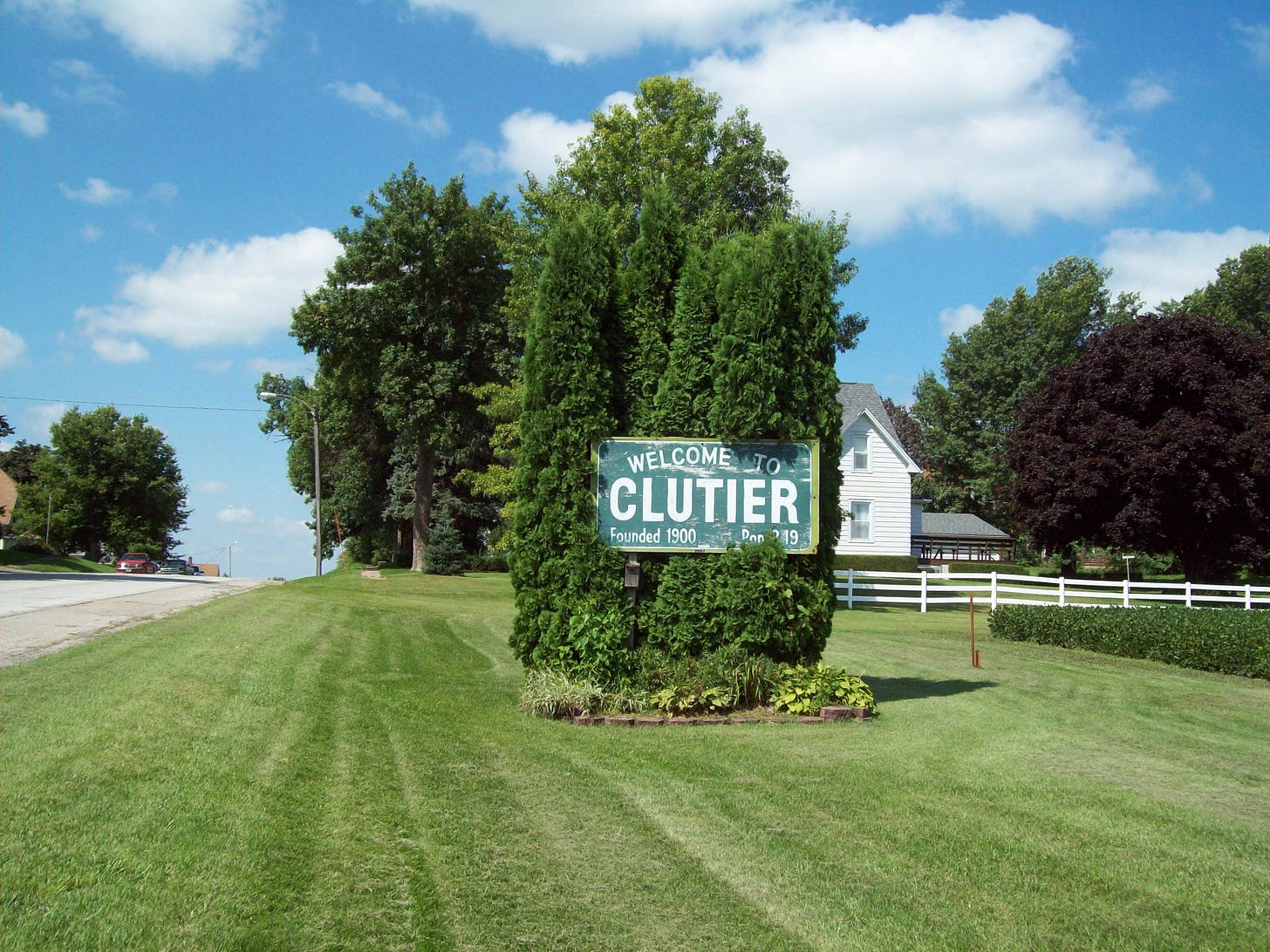My Grandma Pohlman moved from the farm to town when I was a kid. By town, I mean the village of Clutier. This booming metropolis has a population slightly north of two hundred. While the old school was already decaying as windows routinely were broken out, the small community church lives on. My mom’s side of the family went to grade school in Clutier before being shipped off to the megacity of Traer. A town with seven times the population of Clutier. The small Czech village of Clutier was my second home.
As I visited my grandma, we would visit the downtown area. While nothing compared to what it was for when my mom was a child, when I was a wee lad, the downtown had a bit of bustle. There was a small restaurant called My Mother’s Place, a hair salon, a small bank, and a few other businesses. What place stood out was the grocery store.
If it were in New York City, it would be like a bodega. From what I can remember, this store provided essential food to this small farming community. If someone forgot something in their recipe, they could make a quick run to the store. No one needed to drive to the next town over for a grocery store or make a haul to the big city. Up until the 1980s, this town was protected by the enforcement of the Robinson-Patman Act.

The Robinson-Patman Act is my favorite law. Under this law, a supplier cannot sell products to a large grocery store, like Walmart, at a discounted rate due to their market size versus a small, local grocery store. RPA prevents price discrimination. For example, the potatoes on a truck hauling to the Walmart in Waterloo and the grocery store in Clutier are the same price under this law. Unfortunately, in the 1980s, the enforcement stopped. Did Congress repeal this law? Absolutely not. The Robinson-Patman Act has simply not been enforced for nearly forty years.
This lack of enforcement led Walmart to become Walmart. After the government stopped enforcing the law, Walmart became what it is today. While not a superior company compared to the smaller grocery stores, Walmart did not have to play by the rules. It shows. According to a 1965 federal study across multiple cities found that large independent grocers were less than 1 percent more expensive than the big chains wrote Stacy Mitchell in the Atlantic. If you want further information on Walmart’s story, I recommend reading the Walmart chapter in Barons by Austin Frerick.
Walmart is also not the only business to take advantage of this lack of enforcement. Go through any town and about the only business moving in or has moved in in the last twenty years is a dollar store like Dollar General. Unfortunately, these dollar stores do not have fresh produce like the small, independent grocery stores. Once these stores drive the local grocer out of business due to the low prices they get through price discrimination, there is no fresh food, and they can raise their prices.
When these dollar stores have overstayed their welcome and cannot make more money, they close up shop, leaving the town with no grocery options. Instead of having the RPA protecting them from losing their independent grocery store, everyone must drive the next town over or to the big city to the nearest dollar store or Walmart. Due to these large companies’ market power, a small, independent grocery store has a challenging time to come in and fill this gap. To make matters worse, some of these large grocery stores put into place “scorched earth” covenants to prevent anyone else from opening a grocery store after they have left town. The term, food desert, did not exist until after the lack of enforcement of the Robinson-Patman Act. While my story is about rural Iowa, food deserts also exist in urban centers like in Memphis (see the linked scorched earth article) and in Iowa.
While Clutier lost their grocery store years ago, the town I went to church in, Dysart, is fighting this battle. Unfortunately, in 2021, Dollar General moved into town. Then in 2024, the local grocery store posted on social media about their financial trouble. This grocery store is owned by people who live in and partner with the community. Dollar General does not. Their profits are sent back to their headquarters and shareholders. Due to the lack of enforcement of the Robinson-Patman Act, the Dysart grocery store is fighting an uphill battle with its hands tied behind its back.
Fortunately, during the last forty days of the Biden Administration, they awakened an old beast. The Federal Trade Commission filed a couple Robinson-Patman Act suits. While I do not hold out hope on the Trump Administration keeping the old beast alive the entire time, they have not dismissed these actions. More importantly, we do not need only the federal government to act. State governments can also play a role. Recently, like Rhode Island, Minnesota is considering legislation on a bipartisan manner to fight against predatory buying and corporate consolidation. If this legislation becomes law, it prohibits price discrimination like the Robinson-Patman Act does.
Hope is not lost for our small, independent grocery stores. We can protect them. While I will never be able to visit that small Clutier grocery store as a kid again, let us enforce or make new laws to protect other young children. This way they can avoid living in a food desert and visit their small, locally owned grocery store.


